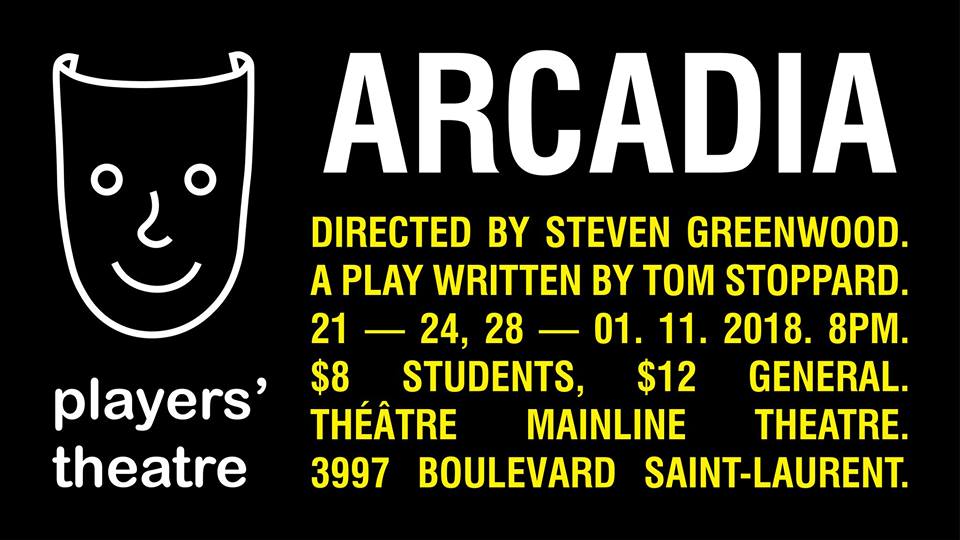Past and present overlap in playwright Tom Stoppard’s Arcadia, a curious exploration of sex and love, mathematics and nature, and the pursuit of knowledge. Presented by Player’s Theatre and directed by Steven Greenwood (PhD candidate in English), Arcadia portrays the curiosity and determination of young scholars in this brilliant rendition of Stoppard’s 1993 tragicomedy.
Arcadia is set in two distinct time periods: The early 19th century and the present day. However, both eras share the same setting, a long table, the enduring presence of which represents the abstract and intangible nature of time. The table stays immobile throughout the play, and the only clear indication of a change in time period are the characters and the impeccable juxtaposition of their costumes and voices.
Set in Sidley Park, an English country home, Arcadia’s first timeline revolves around the young and inquisitive spirit of Thomasina Coverly (Liana Brooks, U3 Science), who studies the intersection of physics and sexuality in the early 1800s with her nihilistic tutor Septimus Hodge (Thomas Fix, BA ‘18). Arcadia then flashes forward to the present day, in which academics convene in the same country house to research the home and its garden. The academics include Hannah Jarvis (Tess McNeil, U3 Arts & Science), a practical scholar frustrated by the sexism inherent to academia, and Bernard Nightingale (Huxley Anjilvel, U2 Arts), a charismatic yet stubborn young man who represents the institutional barriers that Jarvis resents.
Greenwood creates smooth and coherent transitions between the past and the present, and although the set remains static, the space is transformed by what transpires within it. The characters from the 19th century exude nobility, their aristocracy depicted by their intricate costumes and verbose dialogue. Lady Croom (Hazel Neil, U1 Arts) and Ezra Chater’s (Lucas Amato, BS ‘18) blustery personalities, both of which comedically captured the sophistication of the represented period, also underscore the signifiers of the time period. The overt gender dynamics also symbolize the past in Arcadia, as exemplified by Septimus Hodge’s condescending tone and authority over Thomasina.
Young Thomasina and Septimus Hodge partake in hilarious conversations revolving around larger discussions of sex and math that far exceed the maturity levels of the young scholar. Their tutoring sessions quickly devolve into discussions of grandiose themes and questions, and the actors’ chemistry makes for realistic, reflective, and memorable interactions.
The present day trades the luxury of the 19th century costuming by dressing stuffy academics in drab suits and stiff attire. Bernard captures the trope of the tenured professor and the profession’s associated vanity. He personifies institutional misogyny, constantly dismissing Hannah’s research and unfairly giving her book a poor review. Though he is more concerned with undermining his subordinates than with his own research, he continues to receive public praise. McNeil successfully captures her character’s frustrations with Bernard through a fiery determination to uncover the histories of Sidley Park and prove him wrong. In its depictions of both past and present, Arcadia critiques academia’s patriarchal structure.
“I am always drawn to projects that restore lost histories, particularly stories that have been lost due to oppression and marginalization,” Greenwood said.
Stoppard displays a passion for knowledge across multiple disciplines, including poetry, science, math, philosophy, and history. Arcadia embodies the intersection of these disciplines across two different time periods, reflecting the parallels between characters and their intentions in the contrasting temporalities.
Arguably, the irreversibility of time is Arcadia’s most dominant theme. Thomasina’s tutoring sessions on thermodynamics and heat reveal the bitter truth that time only moves forward and that heat can only travel in one direction.
“Newton’s equations go forward and backward,’ Thomasina said. “They do not care which way. But, the heat equation cares very much. It only goes one way.”
Thomasina’s insightful ideas and heartwarming personality, beautifully portrayed by Brooks, leave the audience questioning time and nature long after the end of the play.








